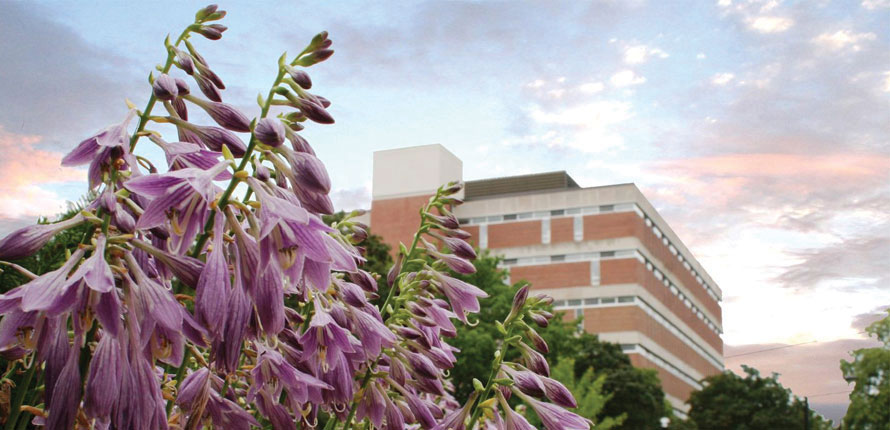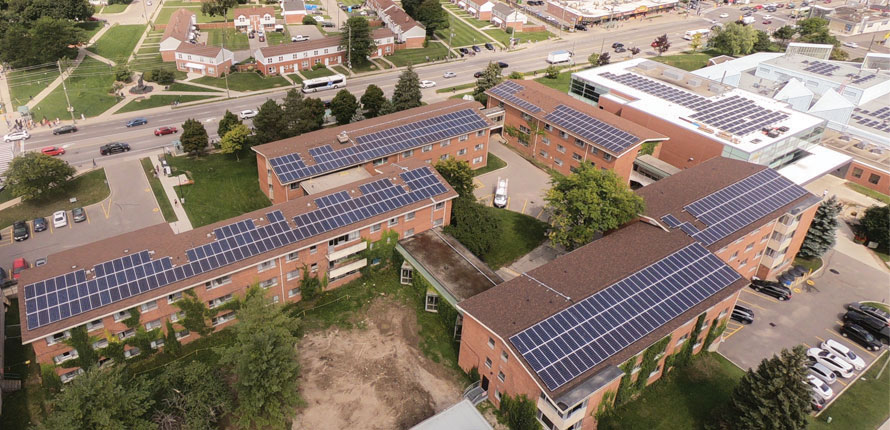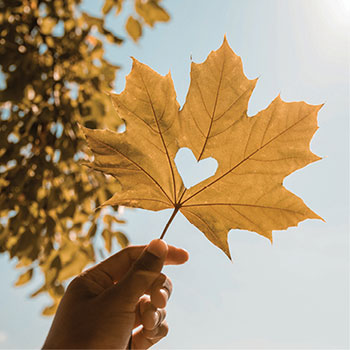
“It is the quality and engagement of our people that makes Laurier an exceptional hub of teaching, learning, research, and community.”
Deborah MacLatchy
While the COVID-19 pandemic kept us physically apart, Laurier continued to build thriving communities and support future readiness and persistence in our students, faculty and staff. Throughout the pandemic, our essential workers remained on the Waterloo and Brantford campuses to ensure teaching, learning, research and other critical university operations continued. Over 1,200 students opted to live in residences during the 2020-2021 academic year, with the wellness centres, food services and athletics working to ensure a safe and exceptional student experience. At the same time, staff and faculty members pivoted from the office to working from home to ensure continuity of courses and operations in the midst of a global disruption.
Laurier’s full-time faculty and contract-teaching faculty supported students learning in a virtual environment with innovative instructional methods. Tristan Long, associate professor of Biology, took students on ‘field trips’ through YouTube videos from his kitchen, teaching data collection with bananas. Kira Omelchenko in the Faculty of Music facilitated a cross-departmental project with students in the Department of English and Film Studies to produce and edit videos featuring Laurier orchestral students. Ken Jackson, associate professor in the Lazaridis School of Business and Economics, was recognized with a Minister’s Award of Excellence from the Ontario Ministry of Colleges and Universities for his open-door approach to communicating and engaging with hundreds of students during a difficult period of transition.
Bruce Gillespie, associate professor of digital media and journalism, was also recognized with a Minister’s Award for his One Market podcast, which kept the Brantford campus informed and connected during the pandemic.
Researchers at Laurier also continued their work throughout the pandemic, with many stepping up to share their knowledge and expertise as the public sought answers. Jonathan Crush, a professor in the Balsillie School of International Affairs at Laurier collaborated with researchers at the University of Waterloo and Nanjing University in China to examine how quarantine measures, unstable supply and fear impacted food security in Wuhan and Nanjing, China, during the early days of the pandemic.
Tammy Schirle, professor of economics, used her expertise in labour economics to provide advice to Prime Minister Justin Trudeau on emergency relief strategies and acted as a key resource to journalists as she provided context to the pandemic’s unprecedented impacts on the labour market.
In an unprecedented year, Laurier’s staff, faculty and students embraced the spirit of innovation to continue exceptional work that had significant impact in the university’s host communities and beyond.
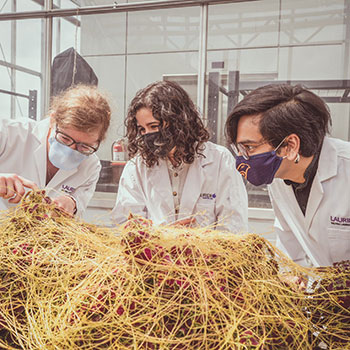
Laurier continues to build new relationships and strengthen existing ones to enhance the lives of those both inside and outside the university. Despite the limitations imposed by the pandemic, faculty, staff, students and alumni found innovative ways to connect and mobilize.
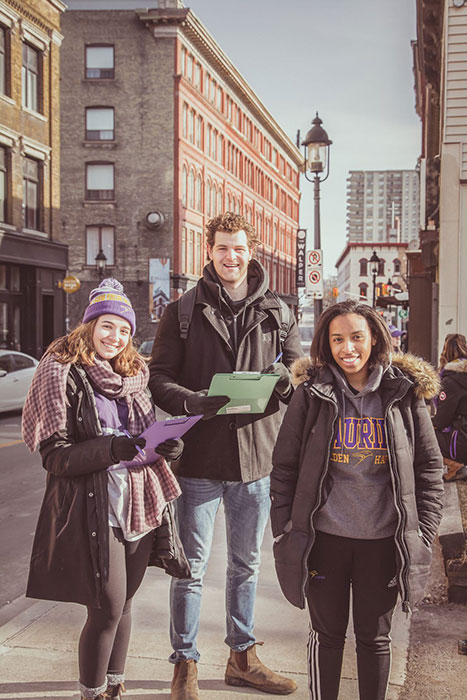
In February 2021, the Faculty of Music’s Making Space for Music campaign hit a significant milestone when support reached $11.3 million, or 75 per cent of the $15-million goal. The campaign received a significant boost when long-time Laurier supporters Robert and Judith Astley offered up to $375,000 to match every donation made toward the Carruthers Practice Studios, named in honour of former dean Glen Carruthers, who passed away in December 2020 from cancer. In under three months, more than 250 donors came together with the Astleys to raise more than $780,000 in support of this project. Laurier Chancellor Eileen Mercier also contributed a generous leadership gift in support of the Carruthers Practice Studios. This gift built on the $4-million gift to the campaign made by Board of Governors member Savvas Chamberlain through the Savvas Chamberlain Family Foundation. In reaching the 75 per cent milestone for Making Space for Music, Laurier is now formally beginning the planning and construction phase for the newly renovated spaces in the Faculty of Music.
In July 2021, the Lazaridis ScaleUp program companies surpassed $1 billion in new capital raised. This milestone represents the collective achievements of 62 Canadian companies from coast-to-coast that have participated in the program since its inception in 2016. The ScaleUp program, located within the Lazaridis Institute for the Management of Technology Enterprises, as part of the Lazaridis School of Business and Economics, helps high-potential companies transition from founder-led organizations to scalable businesses that compete in global markets.
With Government of Ontario approval of the Milton campus in June 2021, Laurier took the next step on its multi-campus journey. This historic moment represented more than a decade of dedicated work between the university and the Town of Milton. Beginning in 2024, Laurier will offer integrated STEAM (science, technology, engineering, arts and mathematics) programming to meet the growing need for holistically-trained skilled professionals in Canada. The Milton campus will be research intensive and extend Laurier’s research focus in sustainability, climate change and water.
In February 2021, Laurier partnered with the Brant County Health Unit to provide space for a mass COVID-19 immunization clinic in One Market, a former downtown shopping centre that the university is renovating to become a hub for student and community activity. The clinic site was chosen for its accessibility by public transportation and opened at the beginning of March. By August 2021, more than 75,000 vaccine doses had been administered at the site.
The pandemic sidelined varsity sports in 2020, but Laurier’s Golden Hawks turned a friendly rivalry into a way to support the Canadian Blood Services by engaging in a ‘Blood Battle’ with the University of Waterloo Warriors. Coaches, athletes, support staff and fans rolled up their sleeves, donating 266 units of blood to the life-saving service, contributing to Laurier’s record-breaking donation of 477 units of blood in 2020.
Laurier embraces Indigeneity as an integral part of its institutional identity and continues to work towards incorporating Indigenous knowledges into the life of the university. In the last year, Laurier has taken significant steps to achieve its Indigenization goals.
The Laurier Research Strategy 2020-2025 identifies Indigeneity, Decolonization, Equity, Diversity and Inclusion as a strategic research priority. Laurier’s exceptional researchers are making significant contributions in this area. Cody Groat, a PhD candidate in History, is studying the Historic Sites and Monuments Board of Canada and its integration of Indigenous history and culture into the national narrative. His work will help inform how existing systems can be adapted to better recognize Indigenous ways of knowing. In 2020, associate professor of Social Work Kathy Absolon was awarded an Insight Grant by the Social Sciences and Humanities Research Council to collaborate with colleagues at universities across Canada to establish best practices for decolonization education.
In 2020, the Centre for Indigegogy, housed within the Indigenous Field of Study in Laurier’s Faculty of Social Work, launched the Wholistic Healing Practices and Colonial Trauma Certificate to equip social work practitioners with a better understanding of the historical and present structural violence that is at the root of trauma in Indigenous communities. This certificate was developed with the desire to give practitioners and helpers the knowledge and skills to decolonize their practice, while also offering wholistic healing practices. The program has been highly successful in the virtual environment, with people from around the world registering. Laurier social work associate professor, and Lyle S. Hallman Research Chair, Gus Hill, who is also an instructor within the Centre for Indigegogy, published his book in 2021. Indigenous Healing: Voices of Elders and Healers shares traditional healing knowledge and bridges the cultural divide between Indigenous and non-Indigenous peoples.
In 2021, Laurier appointed Darren Thomas, associate professor of Indigenous Studies, as the inaugural associate vice-president of Indigenous Initiatives. This role was created to provide strategic advice, support and expertise to academic and administrative units across the institution to achieve Indigenization goals. In the coming year, Dr. Thomas will lead the development of an institutional Indigenization strategy.
In 2020-2021, the launch of the Four Seasons of Reconciliation course for faculty and staff supported learning about Indigenous histories and cultures and the university’s role in reconciliation. Over 450 staff and faculty have now completed the course, with more than 220 currently enrolled. Following course completion, staff and faculty are encouraged to participate in a guided discussion focused on the post-secondary education’s sector’s role in meeting the 94 Calls to Action from the Truth and Reconciliation Commission.
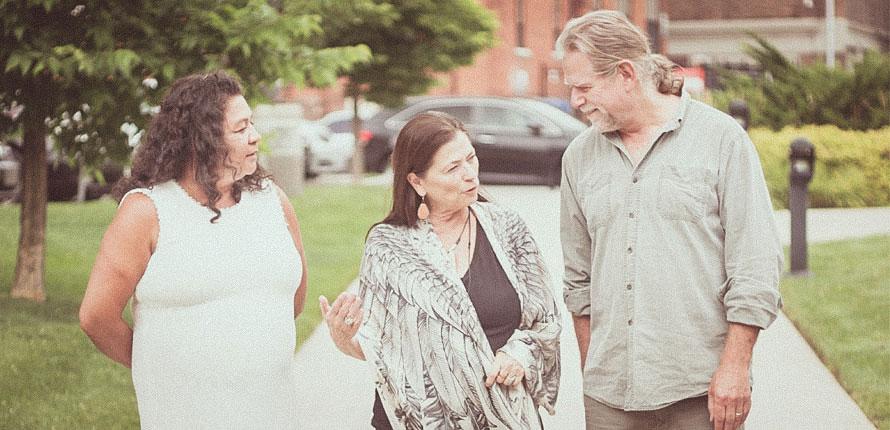
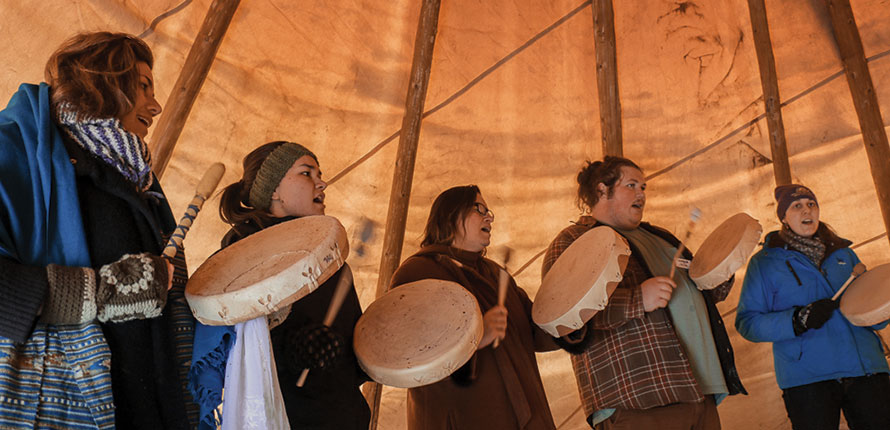
In the last year, Laurier has pursued strategic international partnerships and Laurier faculty and staff have found innovative ways for all students to gain global experiences despite COVID-19 travel restrictions.
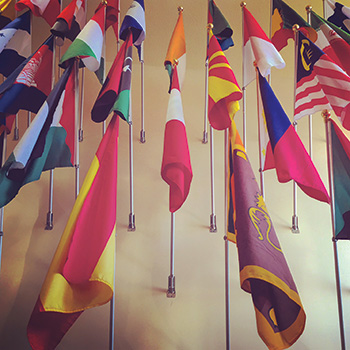
In March 2021, Laurier announced a 10-year partnership with Navitas, a global higher education organization, which will transform international education at the university. The Wilfrid Laurier International College, located on the Brantford campus, welcomed its first 21 students virtually – from 12 different countries – in September 2021, with the intention for the students to be physically on campus for Winter 2022. This one-year pathway program for international students offers highly customized academics and social supports. Upon completion of the program, international students are able to continue their studies on either the Brantford or Waterloo campus.
In July 2021, geography and environmental studies assistant professor Alison Blay-Palmer hosted the Territorial Governance for Sustainable Food Systems Dialogue to develop ideas about how territorial governance can transform regional food systems. Blay-Palmer, the UNESCO Chair on Food, Biodiversity and Sustainability Studies, engaged experts from around the world to lead the development of food policies and practices to build resilient food systems, which helped inform the UN Food Systems Summit.
With the pandemic preventing international travel, human rights and human diversity associate professor Stacey Wilson-Forsberg had to reimagine her Mexico Migration and Human Rights field course that normally would have Laurier students travel to Mexico. In collaboration with a colleague at the Tecnológico de Monterrey, Wilson-Forsberg created a virtual global classroom where her students and students from Mexico could connect and learn together. The class featured eight international guest speakers and opportunities for the students to collaborate on assignments.
Every day, Laurier faculty and students engage in dialogue, testing and challenging a broad range of perspectives using evidence, reason and frameworks of knowledge. In the classroom, through lectures, research symposiums and other events, Laurier faculty and students contribute their thoughts and work to the public discourse.
Over the last year, Laurier’s faculty have shared their research expertise on current events in a free public webinar series called Inspiring Conversations. In 2020-2021, Laurier faculty hosted seven lectures on current affairs topics ranging from COVID-19, to the Black experience in Canada, to how online gaming can support education and social connection. These lectures provided the opportunity for the public to ask questions and engage in thoughtful dialogue about timely topics.
The Academic, Creative and Engaged Research Showcase (ACERS) is a well-loved annual event on Laurier’s Brantford campus where undergraduate students have the opportunity to present their research to their peers and the wider community. In 2021, as the event moved to a virtual format due to the pandemic, Laurier used the opportunity to encourage students from both campuses to participate. Students submitted 58 digital presentations that showcased their research, ranging from posters to podcasts to videos.
The Office of Indigenous Initiatives collaborated with faculties and departments across the university to host Indigenous scholars, knowledge keepers, leaders and artists from around Canada to give public talks and participate in moderated discussions throughout the year. Highlights included Indigenous Education Week, where over 700 people attended four virtual events featuring speakers from across Canada, including author Lee Maracle and Member of Parliament Jody Wilson-Raybould, and the Indigeneist Research Symposium, where Indigenous experts discussed Indigenous data sovereignty. The Centre for Cold Regions and Water Science and Balsillie School of International Affairs also hosted political scientist Eli Enns for a lecture on Indigenous-led conservation in Canada.
Creative writing instructor Souvankham Thammavongsa, who taught in the English program on the Brantford campus, won the 2020 Scotiabank Giller Prize for her book of short stories How to Pronounce Knife.

In 2020, Laurier put in place an equity, diversity, inclusion and Indigeneity action plan to make a more concerted effort to actualize the university’s aspirations in building an inclusive community. In the last year, the university has accomplished almost all the goals established in the action plan, with the acknowledgement that work in creating a more just and equitable institution is an ongoing effort.
Physics and computer science professor Shohini Ghose was awarded the NSERC Ontario Chair for Women in Science and Engineering in 2020. The five-year appointment will provide Ghose with significant research funding and a network of collaborators across Canada as she works to develop and implement a communication and networking strategy to enhance opportunities for women in science and engineering.
Community Psychology associate professor Ciann Wilson was awarded the Ontario Confederation of University Faculty Associations’ 2020-2021 Status of Women and Equity Award of Distinction in recognition of her leadership and service on issues of social justice, equity, diversity and inclusion. Wilson focuses her scholarly studies and mentorship on the realities of Black, Indigenous and people of colour communities with the aim to improve community health and wellbeing.
Throughout the 2020-2021 year, 17 individuals from across the university, under the leadership of Barrington Walker, associate vice-president: equity, diversity and inclusion, engaged in a number of consultations with staff, faculty and students to inform creation of an institutional EDI strategic plan. This plan, which will be shared publicly and implemented in 2021-2022, will align with Laurier’s academic mission and create a framework to guide Laurier’s efforts in building an inclusive community.
In May 2021, Laurier announced its intentions to recruit no fewer than 12 tenured and tenure- track faculty appointments: six Black and six Indigenous scholars. This hiring initiative, developed in collaboration with the Wilfrid Laurier University Faculty Association (WLUFA), embodies Laurier’s vision to fully embrace discovery, scholarly exploration, and application of new ideas, while engaging and challenging the world in all its complexity. This program is representative of the university’s efforts to promote inclusion and the full participation and sense of belonging of students, faculty, staff and alumni.
Responding to concerns about the negative impacts of remote learning on accessibility and the barriers to providing appropriate learning accommodations, Dr. Kathleen Clarke in the Faculty of Education is partnering with the National Educational Association of Disabled Students (NEADS) to examine the virtual-learning experiences of graduate students with disabilities. She was awarded a Partnership Engage Grant in SSHRC’s COVID-19 Special Initiative competition to support her work. Clarke’s research team aims to identify potential barriers to accommodation and champion innovative best practices that have emerged throughout the pandemic.
For the first time in Laurier’s history, the university launched a voluntary student self-identification survey to better understand the demographics of the student body. Moving forward, these data will help inform Laurier’s commitments to equity, diversity and inclusion through the development of student supports and services that are tailored to current students. A better understanding of the make-up of the student body will also help inform the cultivation of a representative faculty and staff body.
The virtual environment of the last year presented challenges, yet also provided opportunities for students to think creatively, innovate, practice leadership and apply ethical frameworks to problems.
In March 2021, Laurier’s User Experience Design Program, led by professor Abby Goodrum, through the support of Scotiabank, hosted its inaugural Canada-wide user experience (UX) design challenge. The challenge asked university and college students from coast-to-coast to tackle problems related to climate change with students competing for $8,500 in prize money that they could apply to implementing their idea. During the month-long virtual event, 122 students submitted 52 entries, with a team from Laurier winning the grand prize for its idea to create a classroom app to help young students track their habits to reduce their carbon footprint.
Lazaridis School of Business and Economics students have a reputation for performing well in international business case competitions and 2020-2021 was no exception. Some notable achievements include a 1st place win in the 1 Race 4 Oceans Challenge, a 1st place in the Enactus Canada National Exposition, a 2nd place in the Enactus World Cup and a 1st place at the Family Enterprise Case Competition in Vermont. For the eighth time, Lazaridis students earned a School of the Year win at JDC Central Competition – the largest undergraduate business competition in central Canada.
To provide greater understanding of the complexities of the pandemic, a group of Laurier professors collaborated to develop a 12-week undergraduate course called COVID-19: From Cell to Society in which students explore the effects of the pandemic through an interdisciplinary lens. The Faculty of Science and the Department of Health Sciences secured Dr. Felix Munger to lead the course development in collaboration with 14 faculty members from across the Brantford and Waterloo campuses, whose areas of research expertise covered virology, immunology, epidemiology, public health, history, geography, communication studies and psychology.
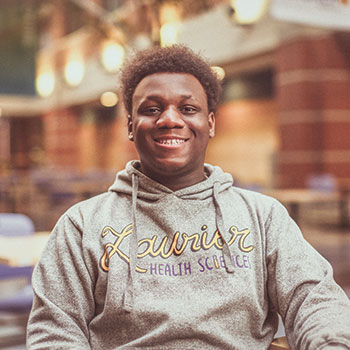
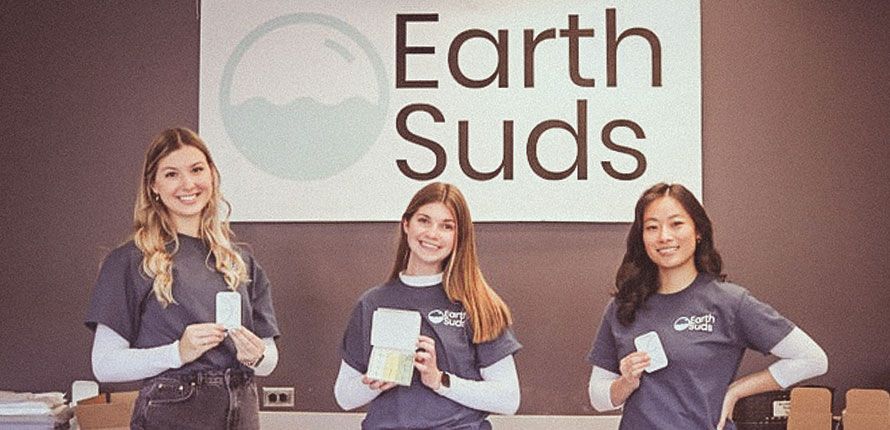
Laurier continues to develop as a research-intensive university with faculty across disciplines engaging in scholarship that addresses the most pressing local and global challenges. Laurier’s Strategic Research Plan 2020-2025 identifies six strategic research priorities: environments and sustainability; psychological and social determinants of health and well-being; governance and policy; Indigeneity, decolonization, equity, diversity and inclusion; business, technology and innovation; and society, culture and community.

Since 2010, Laurier has enjoyed a strong partnership with the Government of the Northwest Territories in cold regions research. Ongoing research projects are aimed at better understanding the impacts of climate change on ecosystems, food security and water resources. In the last decade, 348 students and postdoctoral fellows have been trained under this partnership with $38.2 million in external research funding secured.
Chemistry and biochemistry professor Hind Al-Abadleh completed a research study that demonstrated a 20 per cent drop in pollutant levels during the first COVID-19 lockdown in Ontario. In 2020, Al-Abadleh also launched a pilot air quality monitoring project in partnership with the City of Kitchener and Hemmera Envirochem Inc. The team installed sensor systems close to Kitchener public schools to collect air pollution data for public viewing and to inform the city’s climate action plan.
Stephanie DeWitte-Orr, associate professor in the Departments of Health Sciences and Biology, led a team of virologists conducting pre-clinical testing on two antiviral drugs that could be used to prevent human coronaviruses from replicating in lung cells. Throughout the pandemic, DeWitte-Orr has also shared her insights and expertise with media to help the public better understand coronaviruses, how they spread, and how they can be stopped.
Associate professor of history Christina Han is directing her research efforts toward unearthing and preserving Brantford’s diverse immigrant history. She received a SSHRC Insight Grant to analyze, compare and present the spatial histories of Brantford’s Armenian, Italian and Chinese communities between 1900 and 1920. Han will create a deep map, a digital, interactive representation of the city, to bring archival data and personal narratives to life.
Mathematics professor David Soave has been collaborating with the Ontario Institute for Cancer Research analyzing patient data to identify and understand factors that contribute to disease. Dr. Soave’s current focus is on analyzing data from large prospective health cohorts, where participants are followed over time to correlate individual profiles with cancer outcomes. Using molecular genetic data from participants, he is developing statistical models to predict cancer risk prior to the onset of symptoms. Establishing pre-cancer risk prediction models can lead to improved screening and treatment for patients.
Laurier is meeting the needs of people facing a rapidly changing world of work by expanding the ways in which students can access a university-level education. Even before the pandemic, the workplace was undergoing significant change, increasing the need for continuing education and skills training. In 2020-2021, the university created 26 new continuing education offerings ranging from bootcamps, to full courses and micro-credentials, to meet the varied needs of students at all life stages.
In 2020, Laurier’s continuing education department partnered with Communitech to develop non-credit upskilling and reskilling training for employees in the Waterloo Region in two of today’s most in-demand skill areas: communications and sales. Through a combination of three-week sprint learning modules developed by industry practitioners and offered through Communitech Academy and two six-week immersive courses delivered by Laurier faculty, 40 mid-career employees in Waterloo Region expanded their skill sets as part of a pilot project for future-proofing communities.
In January 2021, to meet the needs of those working in the legal, social, Indigenous rights and public safety sectors, the Faculty of Human and Social Sciences and the Office of Indigenous Initiatives launched a certificate program for professionals to learn more about the Gladue Principles and restorative justice. The Gladue principles are based on recommendations that courts consider an Indigeneous person’s background when sentencing, stemming from a 1999 Supreme Court of Canada decision that acknowledged the Canadian criminal justice system is systemically discriminatory in its treatment of Indigenous peoples.
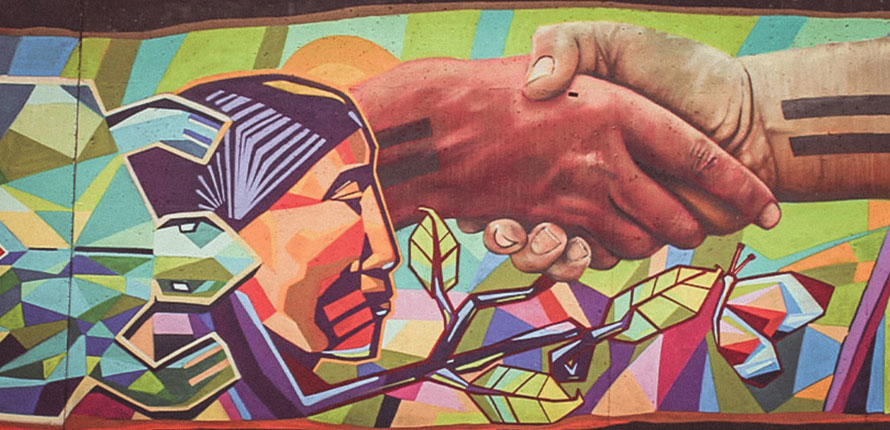
Laurier provides a significant number of opportunities for students to reflect on what they learn in the classroom and connect it to meaningful experiences in other learning environments. The university is a national leader in employment rates for co-op students and was the first school in Canada to launch a competency-based co-curricular record. Despite the pandemic, Laurier students continued to engage in experiential learning in a myriad of ways.
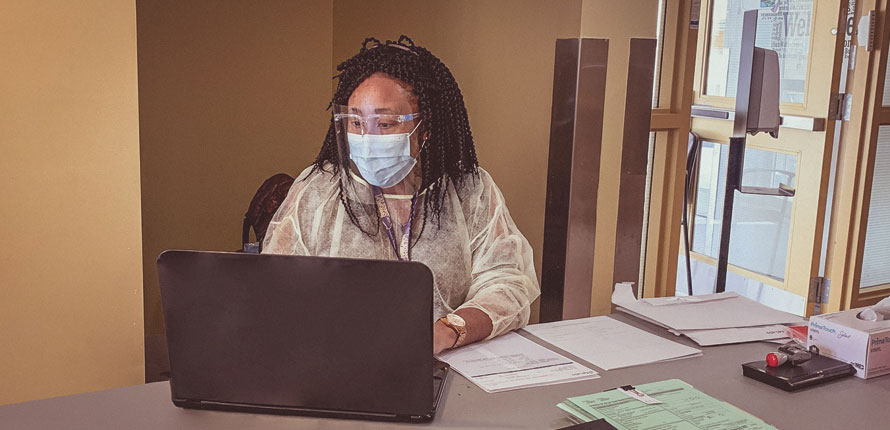
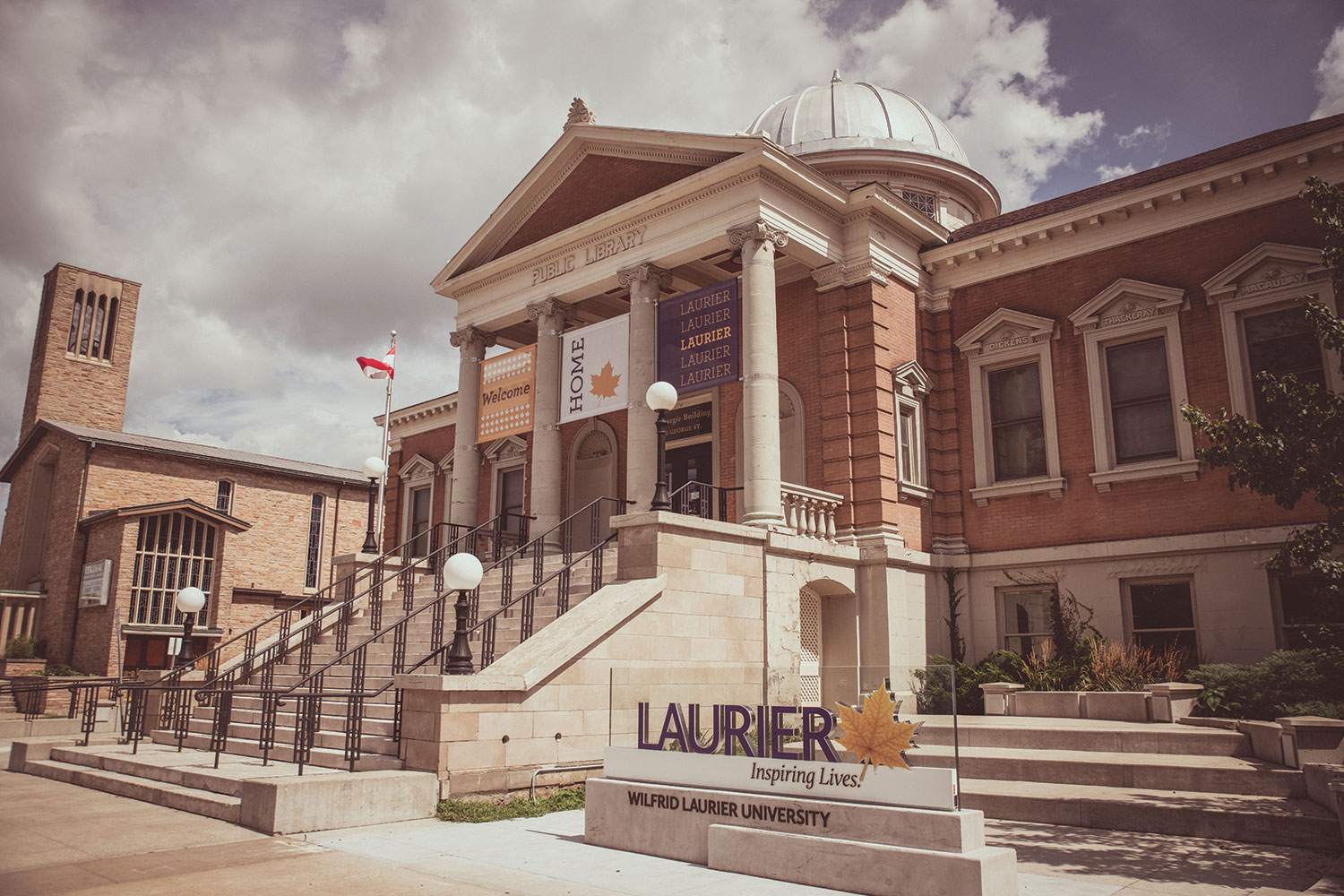
Co-op employment rates for fall 2020 and winter 2021 were 99% and 99.5% respectively, well above the national average of 80% and 85%, as reported by Co-operative Education and Work-Integrated Learning Canada. These numbers demonstrate that despite the remote environment, employers were keen to hire Laurier students for work terms. In addition, in 2020-2021, more than 2,200 students engaged in short-term work placements and projects with community organizations and businesses.
In January 2021, Community Health student Simone Alexander found a work placement at Brantford’s John Noble Home, a non-profit long-term care facility. During her placement she worked at the front desk and in the COVID-19 swabbing clinic, providing the John Noble Home with much-needed skilled help, while at the same time applying what she learned at Laurier to a health care setting.
Students in Laurier’s Master of Applied Politics program used a remote research practicum to help community organizations develop fact sheets, organizational reports and strategic plans. Student Melody Greaves (BA ’19) worked with the Brantford-based Grand River Council on Aging to develop a financial sustainability plan and virtual fundraising toolkit in response to challenges the organization faced in fundraising activities due to the pandemic. Greaves attended board of director meetings and sub-committee discussions, and her work supported the strategic planning process for the organization.

“Sustainability is a contact sport: you’ve got to get out into the community and try new ideas.”
Barry Colbert, Associate Professor, Policy, Lazaridis School of Business and Economics
Laurier recognizes that universities have both the capacity and responsibility to lead by example in the pursuit of sustainability. Through research, teaching, student activity and our own operations, Laurier has become a green leader in the post-secondary sector. Sustainability highlights from the past year include infrastructure projects to further reduce greenhouse gas emissions and improve energy efficiency, collaboration with community partners on climate action, and events that help prompt students, staff and faculty on behaviour shifts to more sustainable practices.
In 2020-2021, Laurier accelerated key infrastructure projects related to the Laurier Energy Efficiency Program (LEEP). This included completing the majority of the power generation infrastructure needed for the microgrid on the Waterloo campus, which came online in the summer of 2021. The microgrid connects rooftop solar panels to reduce the campus electrical demand from the provincial grid. It automatically dispatches solar generated energy during periods of high provincial power demand to reduce the province’s need to use greenhouse gas and other low efficiency power sources. This system improves operational resilience, reduces Laurier’s emissions and minimizes electricity charges for the campus.
At the end of 2020, the City of Brantford launched a Community Climate Change Advisory Team and Laurier was invited to sit on this team alongside the municipal government, school board representatives, the health unit, local utilities and other businesses. The team’s goal is to develop a plan to move the Brantford community towards net-zero emissions by 2050.
In June 2021, Barry Colbert, associate professor, policy, in the Lazaridis School of Business and Economics, received a Social Sciences and Humanities Research Council grant to study the role of innovation intermediaries in leading sustainable transitions. Colbert, who is director of Laurier’s Co-Operators Centre for Business and Sustainability, will focus his research on how civil society organizations such as NGOs, service providers, advocacy groups and consultancies can act as catalysts to drive collaboration between industry, government and academia to accelerate transitions to more sustainable practices.
